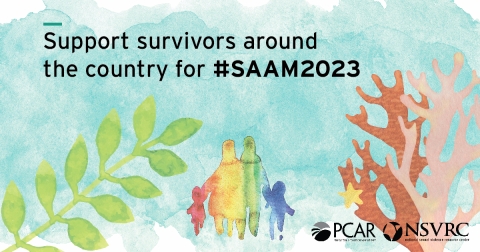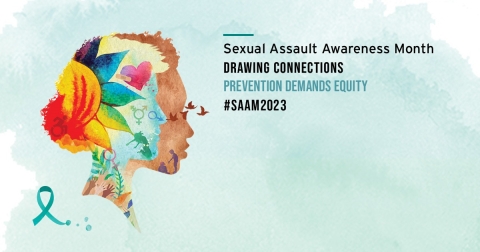Laura Palumbo is Communications Director at the National Sexual Violence Resource Center. Laura works on strategic messaging, media engagement and educational materials to promote that prevention is possible. For seven years she had led NSVRC in developing materials for advocates, parents, youth and college students.
- Mar 29, 2023
- Laura Palumbo
Support Survivors around the country for #SAAM2023
April marks Sexual Assault Awareness Month (SAAM)! This year’s theme is “Drawing Connections: Prevention Demands Equity.” The campaign calls on all individuals, communities, organizations, and institutions to change ourselves and the systems surrounding us to build racial equity and respect.
- Mar 15, 2023
- Laura Palumbo
Every April, Sexual Assault Awareness Month calls attention to the fact that sexual harassment, assault, and abuse are widespread and impact every person in the community. SAAM aims to raise public awareness about sexual violence and educate communities on how to prevent it.
- Nov 23, 2020
- Laura Palumbo
Regardless of what others expect, you have the right to decide what is best for you and act on those values.
- Nov 05, 2020
- Laura Palumbo
Practicing self-care is an act of compassion toward healing ourselves and the world around us.
- Abr 13, 2020
- Laura Palumbo
During SAAM this April — in the midst of a public health crisis — our support for survivors is more critical than ever.
- Abr 01, 2020
- Laura Palumbo
Consent still plays a role while social distancing.
- Mayo 10, 2019
- Laura Palumbo
There are many reasons this day can be difficult for survivors and their loved ones.
- Feb 25, 2019
- Laura Palumbo
It is important to recognize the different needs, experiences, and vulnerabilities of survivors in different groups.
- Feb 26, 2018
- Laura Palumbo
In honor of National Eating Disorder Awareness Week, we’re shining a light on the intersection of these two issues.
- Feb 21, 2018
- Laura Palumbo
New survey of 843 women in the entertainment industry found 94% say they've experienced harassment or assault.
Paginación
- Página anterior
- Página 3
- Siguiente página










